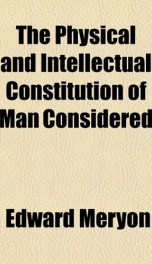the physical and intellectual constitution of man considered

Purchase of this book includes free trial access to www.million-books.com where you can read more than a million books for free. This is an OCR edition with typos. Excerpt from book: CHAPTER II. ON THE TRANSMUTATION OF ANIMALS. Were man distinguished by his organization only, it would be no difficult matter to show that he stands alone, or, in other words, that his species is so rigidly restricted, that whatever modifications may have arisen in the lapse of time, have been so superficial that they have proceeded no farther than to cause slight differences in the relative development of organs. The question of progressive development by transmutation has been stigmatized as puerile and too absurd to require refutation ; but a laugh is not sufficient argument when we find men who have deservedly acquired a high reputation in science tenaciously upholding it, and fondly displaying its captivating simplicity. In Lamarck's Philosophy of Zoology we are taught to believe that great changes in circum- o stances have exercised considerable influence in animals, and have produced similar changes in their wants and actions, which having become permanent, new habits have been acquired, by which means new organs have been formed. Thus it is in strict accordance with his reasoning to imagine a gradual advance in organization from that state of mere vitality, where sensation exists without perception, and motion without volition, till in the course of ages the organs of sense have been su- peradded, and instinctive faculties acquired, and, finally, the irrational brute was converted into the rational man. The upholders of this theory, however, have not shown what only would satisfactorily prove their doctrine, namely, existing animals or fossil remains exemplifying the actual transition from one species to another. The Ichthyosaurus, with its lizard head and fish- like body, did most probably unite the characters both of fish and reptile; but it was a pe...
Info about the book
Author:
Series:
Unknown
ISBN:
1141557835
Rating:
4/5 (2)Your rating:
0/5
Languge:
English
Users who have this book
Users who want this book
What readers are saying
What do you think? Write your own comment on this book!
write a commentGenre
if you like the physical and intellectual constitution of man considered try:
Do you want to exchange books? It’s EASY!
Get registered and find other users who want to give their favourite books to good hands!


